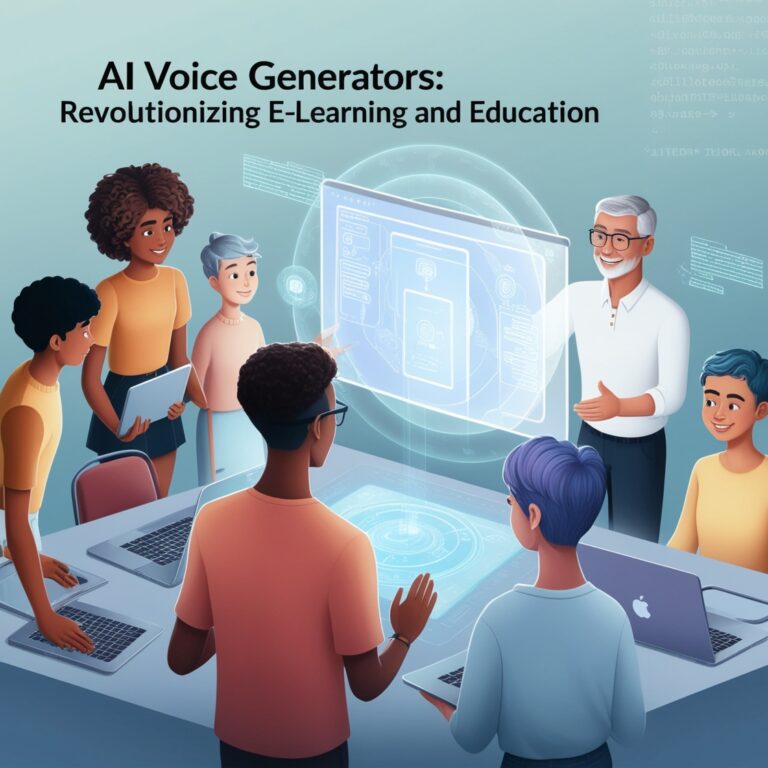The educational scene has changed dramatically over the last decade, thanks in large part to advances in digital technology. Learning has gone beyond the traditional classroom setting and onto students’ screens throughout the world, with online courses and interactive tutorials. One of the most recent breakthroughs to transform education is the AI voice generator, a program that uses artificial intelligence to create lifelike voiceovers for a variety of reasons.
AI speech generators are transforming the way educators, institutions, and corporations provide e-learning information, making lessons more accessible, dynamic, and engaging. These tools also assist content providers in streamlining the creation of educational materials, particularly multimedia content such as videos, tutorials, and presentations. As e-learning becomes more prevalent in modern education, AI speech generators will play an important role in altering how students learn and interact with information.
What is an AI Voice Generator?
AI voice generators employ artificial intelligence to generate human-like speech from text. These technologies use machine learning algorithms to analyze and reproduce the intricacies of human voices, resulting in speech that sounds natural and diverse. AI voice generators can be tailored to match specific requirements, such as providing a conversational tone or a more official delivery.
Text-to-speech technology now allows educators and e-learning platforms to create voiceovers for lectures, tutorials, and learning modules without the need for real voice actors. AI-generated voices sound so lifelike that they may be utilized in a variety of scenarios, such as podcasts, explainer videos, and audiobooks. While these tools were initially confined to simple, robotic-sounding voices, today’s free AI voice generators include a wide range of customizable options to accommodate varied learning contexts.
The Use of AI Voice Generators in E-Learning
AI speech generators are revolutionizing e-learning by improving how educational content is delivered. Here’s how.
1. Making Learning More Accessible
One of the key advantages of AI voice generators in education is greater accessibility. Students with disabilities, particularly those with visual impairments or learning challenges, can benefit greatly from listening to content rather than reading it. AI-generated voiceovers can make learning resources available to everyone, especially students who rely on audio content for instruction.
2. Scaling Education With Ease
Scaling up educational services can provide substantial obstacles for organizations such as schools, universities, and e-learning platforms. Traditional voiceover recordings for online courses, tutorials, and presentations necessitate professional voice actors, studios, and expensive editing equipment. Large-scale initiatives can quickly become costly and time-consuming.
3. Personalising Learning Experiences
Personalization is critical in the rapidly growing field of e-learning. Students today want more personalized learning experiences that address their specific needs and preferences. AI voice generators contribute to this by enabling educators to generate personalized audio content for specific students or groups.
4. Reducing costs and resources
Traditional voiceover production necessitates substantial resources, including experienced voice actors, recording studios, and post-production editing. This can result in significant costs for educational institutions and corporations, especially when producing long-form content such as lectures, tutorials, or webinars.
5. Engaging Students in Multilingual Content
In today’s globalized world, education is no longer limited to a particular language or place. Students from varied linguistic backgrounds frequently require educational materials in multiple languages. Many AI voice generators have multilingual capabilities, allowing educators to effortlessly translate and narrate curricula in other languages.
Real-World Uses of AI Voice Generators in Education
The practical uses of AI speech generators in education are numerous and diverse. Here are some instances of how they are currently used to improve learning experiences:
1. Online courses and tutorials
E-learning sites such as Udemy, Coursera, and Khan Academy are constantly extending their offerings to meet various learning demands. AI voice generators are being utilized to create voiceovers for online courses, allowing teachers to swiftly and efficiently offer high-quality educational content.
Whether it’s a computer science lecture or a creative writing session, AI voice technology allows educators to communicate their information in a polished, professional manner without relying on voice actors.
2. Audiobooks and Educational Podcasts
Audiobooks are becoming more popular in school, offering students an alternative to reading. AI voice generators are being used to turn textbooks, research papers, and other written materials into audiobooks, making education more accessible.
Similarly, podcasts are becoming a popular tool in e-learning, allowing students to receive educational content while commuting, exercising, or doing other things. AI voice generators make it easier to create educational podcasts by producing realistic, human-sounding voices that convey lectures clearly and effectively.
3. Interactive Learning Modules
AI speech technology is also being used in interactive learning modules including quizzes, virtual simulations, and gamified learning experiences. These programs frequently use voiceovers to walk students through various activities or clarify ideas. AI-generated voices improve these encounters by adding a smooth, immersive audio component.
Future of AI Voice Generators in Education
As AI technology advances, speech generators are projected to play an increasingly important role in education. With the emergence of adaptive learning platforms and intelligent tutoring systems, AI speech generators are going to play an ever larger role in personalizing and delivering educational content.
Furthermore, as more advanced video maker apps and video content creation tools emerge, educators will increasingly blend AI speech technology with multimedia content to improve the learning experience. For example, instructors might employ AI to provide voiceovers for free explainer videos, giving pupils dynamic, engaging courses that combine visual and aural features.
Conclusion
The incorporation of AI speech generators into the field of e-learning is changing the way educational content is developed, delivered, and consumed. AI speech technology improves accessibility, scalability, and personalization, making learning more inclusive and efficient. AI speech generators provide educators, institutions, and content creators with a low-cost, user-friendly solution that improves the quality of e-learning content, allowing them to better fulfill the needs of modern education.
As AI advances, the future of education will become even more dynamic, immersive, and personalized to individual learning needs, with AI voice generators leading the way.

